-
 Bitcoin
Bitcoin $82,683.4967
0.78% -
 Ethereum
Ethereum $1,829.2967
1.42% -
 Tether USDt
Tether USDt $0.9999
-0.02% -
 XRP
XRP $2.0967
-0.75% -
 BNB
BNB $606.5472
1.02% -
 Solana
Solana $125.0276
0.61% -
 USDC
USDC $1.0000
-0.01% -
 Dogecoin
Dogecoin $0.1676
0.95% -
 Cardano
Cardano $0.6650
1.26% -
 TRON
TRON $0.2382
2.59% -
 Toncoin
Toncoin $4.1025
5.56% -
 Chainlink
Chainlink $13.5754
1.83% -
 UNUS SED LEO
UNUS SED LEO $9.1395
0.29% -
 Stellar
Stellar $0.2651
-0.15% -
 Avalanche
Avalanche $18.8485
0.75% -
 Shiba Inu
Shiba Inu $0.0...01250
0.76% -
 Sui
Sui $2.2808
-1.77% -
 Hedera
Hedera $0.1640
-1.56% -
 Polkadot
Polkadot $4.0427
0.61% -
 Litecoin
Litecoin $83.3594
-2.70% -
 MANTRA
MANTRA $6.2703
0.56% -
 Bitcoin Cash
Bitcoin Cash $304.1339
1.64% -
 Bitget Token
Bitget Token $4.5229
-1.25% -
 Dai
Dai $0.9999
-0.02% -
 Ethena USDe
Ethena USDe $0.9998
-0.03% -
 Pi
Pi $0.7229
-6.19% -
 Hyperliquid
Hyperliquid $13.0555
5.79% -
 Monero
Monero $215.2463
-1.28% -
 Uniswap
Uniswap $6.0107
2.74% -
 Aptos
Aptos $5.2988
0.53%
What are the consequences of setting the Gas Limit incorrectly when transferring money through an Ethereum wallet?
Incorrectly setting the Ethereum gas limit can result in transaction failure (too low) or excessive fees (too high), potentially leading to wasted funds and delays; using a block explorer to check recent transactions helps determine an appropriate limit.
Mar 25, 2025 at 01:35 am
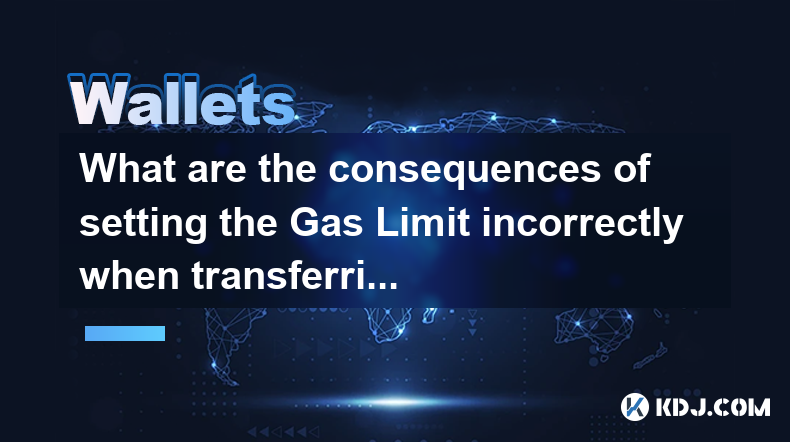
What are the consequences of setting the Gas Limit incorrectly when transferring money through an Ethereum wallet?
Setting the gas limit incorrectly when transferring ETH or ERC-20 tokens can lead to several undesirable outcomes. Understanding gas and its implications is crucial for smooth and cost-effective transactions on the Ethereum network. Incorrectly setting this parameter can result in transaction failure, wasted funds, or even significant financial losses.
First, let's clarify what the gas limit represents. The gas limit is essentially the maximum amount of computational effort (measured in gas units) that you're willing to pay for your transaction to be processed by the Ethereum network. It determines the upper bound of the transaction's cost.
Consequences of Setting the Gas Limit Too Low:
If you set the gas limit too low, your transaction will likely fail. The Ethereum network requires a certain amount of gas to execute a transaction; if the provided gas is insufficient, the transaction will be rejected by the miners, and your funds will remain stuck in your wallet. This doesn't mean your funds are lost, but you will need to submit a new transaction with a higher gas limit, potentially paying higher transaction fees.
- Your transaction will be reverted.
- Your funds will not be transferred.
- You will need to submit a new transaction.
- You might experience a delay in transferring funds.
Consequences of Setting the Gas Limit Too High:
While setting the gas limit too low is problematic, setting it excessively high also carries negative consequences. Although your transaction will likely succeed, you will pay significantly more in transaction fees than necessary. This wasted gas is essentially a loss of funds, as the excess gas is consumed but doesn't provide any additional computational benefit.
- You'll pay more in transaction fees than required.
- This leads to a higher cost per transaction.
- It's inefficient use of your funds.
- You could potentially be targeted by miners who prioritize higher-fee transactions.
Understanding Gas Price vs. Gas Limit:
It's crucial to differentiate between gas limit and gas price. The gas limit is the quantity of gas you're willing to spend, while the gas price is the cost per unit of gas. The total transaction fee is calculated by multiplying the gas limit by the gas price. Setting an appropriate gas limit is crucial to prevent both transaction failure and excessive fees. The gas price, on the other hand, is influenced by network congestion. Higher congestion results in higher gas prices.
- Gas Price: The cost per unit of gas. Fluctuates based on network demand.
- Gas Limit: The maximum amount of gas you are willing to pay for your transaction.
How to Determine the Appropriate Gas Limit:
Most Ethereum wallets automatically suggest a reasonable gas limit for your transaction. However, you can usually adjust this manually. It's advisable to consult resources like Etherscan or similar block explorers to observe the gas limits used in recent, similar transactions. This gives you a good baseline to work from. Avoid drastically deviating from the suggested gas limit unless you have a very specific reason.
- Consult your wallet's suggested gas limit.
- Observe gas limits used in similar transactions on block explorers.
- Don't significantly deviate from the suggested limit without justification.
What if my transaction fails due to an incorrect gas limit?
If your transaction fails due to an insufficient gas limit, you'll need to resubmit the transaction with a higher gas limit. Your funds are not lost; they remain in your wallet. However, you will need to pay another transaction fee. If you set the gas limit too high, the transaction will succeed, but you will have paid unnecessarily high fees. There is no way to recover the excess gas paid.
Frequently Asked Questions:
Q: Can I recover the excess gas paid if I set the gas limit too high?
A: No, the excess gas paid is consumed by the network and cannot be recovered.
Q: What happens if I set the gas price too low?
A: Your transaction might be pending for a long time or fail entirely because miners prioritize transactions with higher gas prices.
Q: How do I find the optimal gas price?
A: Various websites and tools provide real-time gas price estimates, showing the current average and suggested prices. Your wallet may also provide these estimates.
Q: Is there a risk of losing my funds if I set the gas limit incorrectly?
A: You won't lose your funds if the gas limit is too low, but the transaction will fail. You will only lose funds if you pay for an excessively high gas limit.
Q: How can I monitor my transaction's status after submitting it?
A: You can monitor the status of your transaction using your wallet or a block explorer like Etherscan, by inputting your transaction hash.
Q: What if my transaction is stuck?
A: If your transaction is stuck, it's likely due to a low gas price. You may need to increase the gas price and resubmit the transaction. Consider the current network congestion level.
Q: Are there any tools that help estimate the appropriate gas limit?
A: Many websites and tools provide gas limit estimates based on the transaction type and current network conditions. Your wallet likely incorporates this functionality.
Disclaimer:info@kdj.com
The information provided is not trading advice. kdj.com does not assume any responsibility for any investments made based on the information provided in this article. Cryptocurrencies are highly volatile and it is highly recommended that you invest with caution after thorough research!
If you believe that the content used on this website infringes your copyright, please contact us immediately (info@kdj.com) and we will delete it promptly.
- Bitcoin (BTC) price dips below ascending channel pattern as whales mirror a 2020 bull run signal
- 2025-04-01 07:50:12
- Mutuum Finance (MUTM) Has Been Relatively Quiet, But It's Building Fast
- 2025-04-01 07:50:12
- Cardano (ADA) Gains 4% This Week, Trading at $0.74 as Bullish Pressure Builds
- 2025-04-01 07:45:12
- Elon Musk Quashes Rumors of U.S. Government Using Dogecoin (DOGE) in Any Kind of Operations
- 2025-04-01 07:45:12
- Ethereum (ETH) and Solana (SOL) Prices Could Plunge as FTX Begins Creditor Repayments on May 30
- 2025-04-01 07:40:12
- Acting SEC Chair Rejects Enforcement, First US Bank-Issued Stablecoin, Bitcoin's Four-Year Cycle at Crossroads
- 2025-04-01 07:40:12
Related knowledge
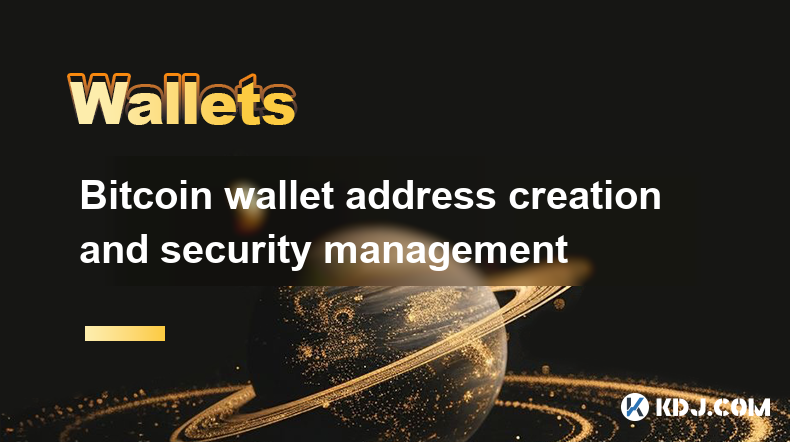
Bitcoin wallet address creation and security management
Mar 31,2025 at 10:56pm
Understanding Bitcoin Wallet AddressesA Bitcoin wallet doesn't store Bitcoin directly. Instead, it stores private keys which are long strings of characters. These keys grant access to your Bitcoin. Your public key, derived from the private key, is used to generate your Bitcoin wallet address, a unique identifier similar to a bank account number. This a...

How to easily generate a Bitcoin payment address
Mar 29,2025 at 10:49am
Generating a Bitcoin payment address might seem daunting, but it's actually quite straightforward. This process is crucial for receiving Bitcoin, as each transaction requires a unique address. Understanding how this works is fundamental to using Bitcoin effectively. This guide will walk you through the simple steps, regardless of your technical experti...
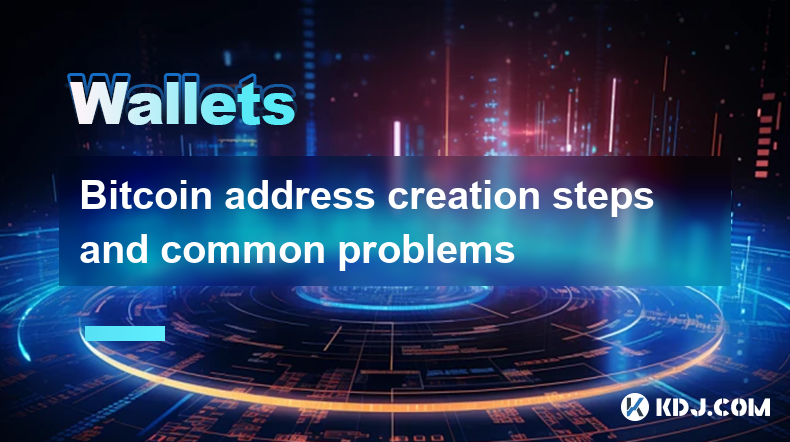
Bitcoin address creation steps and common problems
Mar 30,2025 at 06:07am
Understanding Bitcoin AddressesA Bitcoin address is a unique identifier, similar to a bank account number, used to receive Bitcoin. It's a string of alphanumeric characters generated from a public key, derived from your private key. Understanding the distinction between public and private keys is crucial for Bitcoin security. Your private key should be...
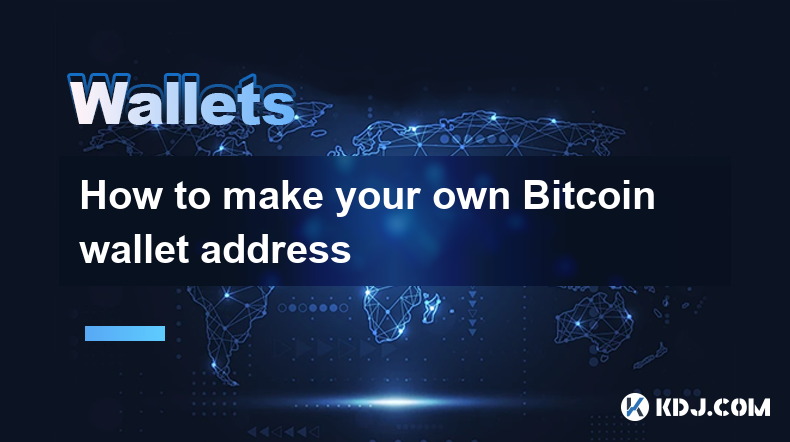
How to make your own Bitcoin wallet address
Mar 29,2025 at 08:42pm
Creating your own Bitcoin wallet address is crucial for securing and managing your Bitcoin holdings. It allows you to independently receive and send Bitcoin without relying on third-party services. This process involves understanding the different types of wallets and choosing the one that best suits your needs and technical expertise. Incorrectly gene...
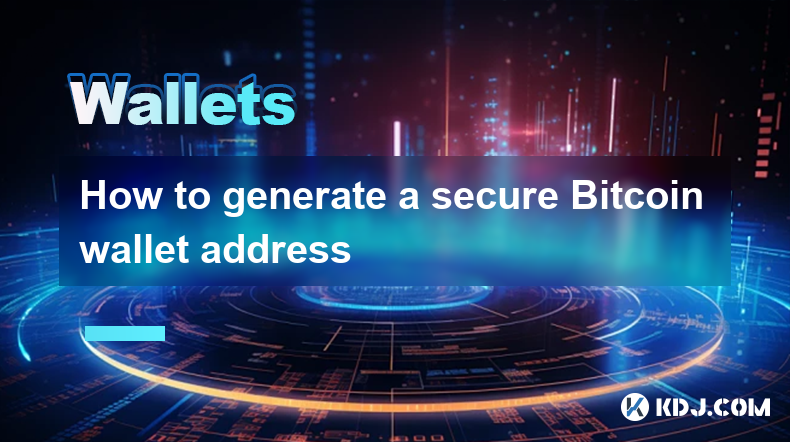
How to generate a secure Bitcoin wallet address
Apr 01,2025 at 03:14am
Understanding Bitcoin Wallet AddressesA Bitcoin wallet doesn't actually store your Bitcoin. Instead, it stores your private keys, which are long strings of characters that grant you access to your Bitcoin. Your public key, derived from your private key, is used to generate your Bitcoin address, a unique identifier similar to a bank account number. This...
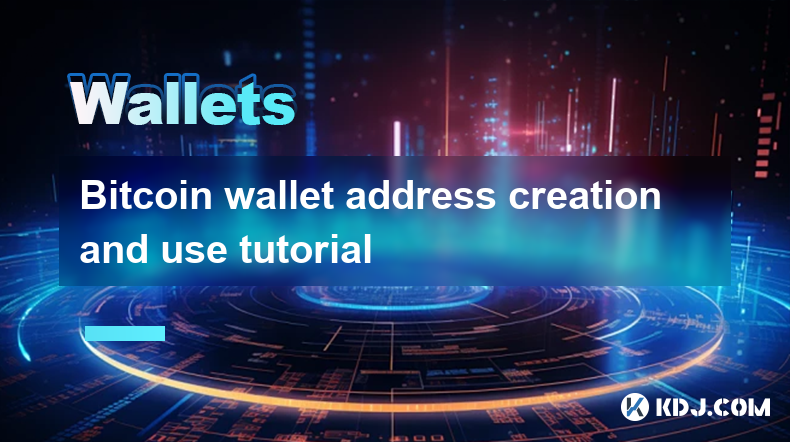
Bitcoin wallet address creation and use tutorial
Mar 29,2025 at 10:14pm
Understanding Bitcoin Wallet AddressesA Bitcoin wallet doesn't store Bitcoin in the way a traditional bank account does. Instead, it stores private keys, which are cryptographic secrets allowing you to access and spend your Bitcoin. Your Bitcoin address, on the other hand, is a public identifier, like an email address, that others can use to send you B...

Bitcoin wallet address creation and security management
Mar 31,2025 at 10:56pm
Understanding Bitcoin Wallet AddressesA Bitcoin wallet doesn't store Bitcoin directly. Instead, it stores private keys which are long strings of characters. These keys grant access to your Bitcoin. Your public key, derived from the private key, is used to generate your Bitcoin wallet address, a unique identifier similar to a bank account number. This a...

How to easily generate a Bitcoin payment address
Mar 29,2025 at 10:49am
Generating a Bitcoin payment address might seem daunting, but it's actually quite straightforward. This process is crucial for receiving Bitcoin, as each transaction requires a unique address. Understanding how this works is fundamental to using Bitcoin effectively. This guide will walk you through the simple steps, regardless of your technical experti...

Bitcoin address creation steps and common problems
Mar 30,2025 at 06:07am
Understanding Bitcoin AddressesA Bitcoin address is a unique identifier, similar to a bank account number, used to receive Bitcoin. It's a string of alphanumeric characters generated from a public key, derived from your private key. Understanding the distinction between public and private keys is crucial for Bitcoin security. Your private key should be...

How to make your own Bitcoin wallet address
Mar 29,2025 at 08:42pm
Creating your own Bitcoin wallet address is crucial for securing and managing your Bitcoin holdings. It allows you to independently receive and send Bitcoin without relying on third-party services. This process involves understanding the different types of wallets and choosing the one that best suits your needs and technical expertise. Incorrectly gene...

How to generate a secure Bitcoin wallet address
Apr 01,2025 at 03:14am
Understanding Bitcoin Wallet AddressesA Bitcoin wallet doesn't actually store your Bitcoin. Instead, it stores your private keys, which are long strings of characters that grant you access to your Bitcoin. Your public key, derived from your private key, is used to generate your Bitcoin address, a unique identifier similar to a bank account number. This...

Bitcoin wallet address creation and use tutorial
Mar 29,2025 at 10:14pm
Understanding Bitcoin Wallet AddressesA Bitcoin wallet doesn't store Bitcoin in the way a traditional bank account does. Instead, it stores private keys, which are cryptographic secrets allowing you to access and spend your Bitcoin. Your Bitcoin address, on the other hand, is a public identifier, like an email address, that others can use to send you B...
See all articles























































































